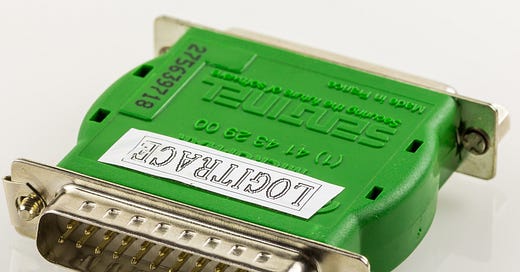If you own a computer, tablet or mobile phone there’s a good chance you have a dongle.
Defined as simply as possible, the word dongle refers to a “small piece of computer hardware that connects to a port on another (electronic) device to provide it with additional functionality,” according to Wikipedia.
There a numerous types of dongles that perform a variety functions.
Generally, the functions of dongles break down into broad categories such as adapters, copy protection and devices that connect peripheral electronic appliances and memory storage devices.

Some dongles are essentially specialized electronic keys that unlock the functions certain types of software or hardware. Other types of dongles extend the functionality of devices, such as allowing Bluetooth devices to connect, allowing devices to connect to other devices such as TVs or monitors, connect incompatible connectors.
USB flash memory drives, sometimes called memory stock, can be considered dongles as can Amazon’s Firestick that allows access to the predatory company’s video streaming service Amazon Prime.
The word “dongle” emerged in the early 1990s as result of the growth of computer industry, very much like the word videocassette emerged from the consumer electronics home entertainment in the early 1980s. https://languagelog.ldc.upenn.edu/nll/?p=1475
From Wikipedia:
There are varying accounts on the etymology of the word "dongle." In a 1999 paper, P. B. Schneck stated that the origin was unclear, but that it was possibly a corruption of the word "dangle" (since these devices "dangle" from a port on a PC).
A 1992 Byte magazine advertisement by Rainbow Technologies claimed that dongles were invented by and named after a person named "Don Gall", which spawned an urban legend. Linguist Ben Zimmer noted that the claim was likely a by-product of their "tongue-in-cheek" marketing style, and "was so egregiously false that the company happily owned up to it as a marketing ploy when pressed by Eric S. Raymond, who maintains the Jargon File, an online lexicon of hacker slang."
There are even alternatives names for specialized types of dongle.
The term “pig tail” is sometimes used for dongles that are long wires with a connector at either end that connect certain types of electronic equipment, such as professional video editing equipment or specialized computer hardware. These devices are often essential to enabling the functions of these types of hardware.
The term “pig tail” refers to these devices somewhat resembling the appendage on the hind ends of porcine animals.
The wide world of dongles:
Many dongles are used to make older or obsolete devices and technology work with newer devices and technology.
From Wikipedia:
Cassette adapters enable cassette-radios to allow AUX in, as with iPod/MP3 player/smartphone/portable CD player.
Personal FM transmitters allow content from a portable media player, portable CD player, smartphone, portable cassette player, or other portable audio system to be heard on an FM radio.
IDE/PATA connectivity can be re-channeled with some dongles:
Both floppy disk and hard disk drives have been emulated on solid-state "dongles" to ensure legacy recognition, allowing SD cards to serve software to old Commodore 64 and Apple II era computers.
Old school video game consoles:
The Everdrive series of game cartridges has enabled classic systems such as the Sega Mega Drive and Nintendo 64 to allow one cartridge to have a number of games that were formerly on multiple cartridges of their own, by use of an SD card with ROMs on them; since it can allow a real game console to access ROMs, which an emulator would normally do.
The Sega 32X was an add-on for the Sega Megadrive which allowed a 32-bit library of games to play on a system that was normally just 16-bit, though it suffered from having its own AC adapter in order to work.
The Nintendo DS contains a cartridge slot used primarily for Game Boy Advance games, but was also used as a slot for add-on dongles such as the Rumble Pak.[7]
USB host connectivity grants more flexibility to computer-based devices
Older cars that "externalized" their CD players and changers from the head unit can now use "emulators" that allow USB and SD cards with MP3s and other audio files to be recognized as "tracks" to the CD control unit circuitry.
Adapters that convert miniature implementations of an interface to the full-sized equivalent, or are required to provide the electrical and mechanical interfaces for expansion cards that cannot physically accommodate them (such as PCMCIA, Compact Flash and ExpressCard expansion cards which are just millimetres thick, too small for a standard connector without having the connector and housing extend beyond the dimensions specified by the standard).
Although commonly referred to as "dongles", the alternative term "Pig-tail" is favoured by some in the IT industry, due to the appearance of a full-sized connection element, with a short, thin wire extending, somewhat reminiscent of the rear of porcine animals. The term is somewhat descriptive, and allows one to avoid using the word dongle except for its original meaning.
Do you have one or more dongles? Do you love or hate them?




